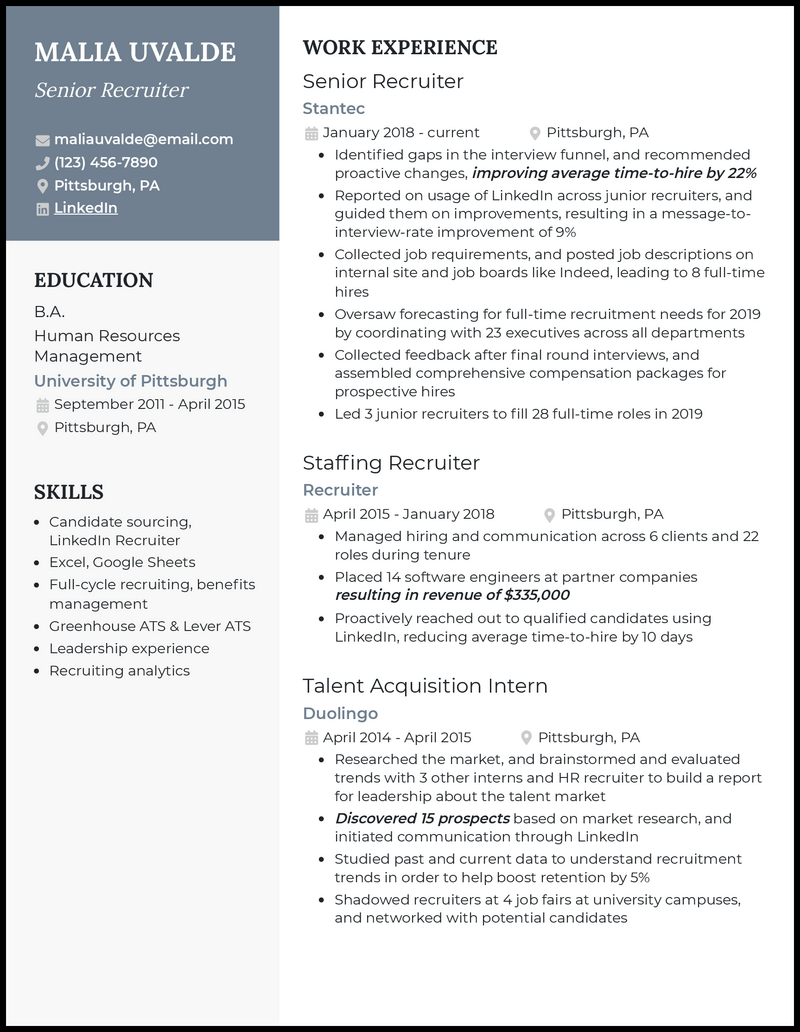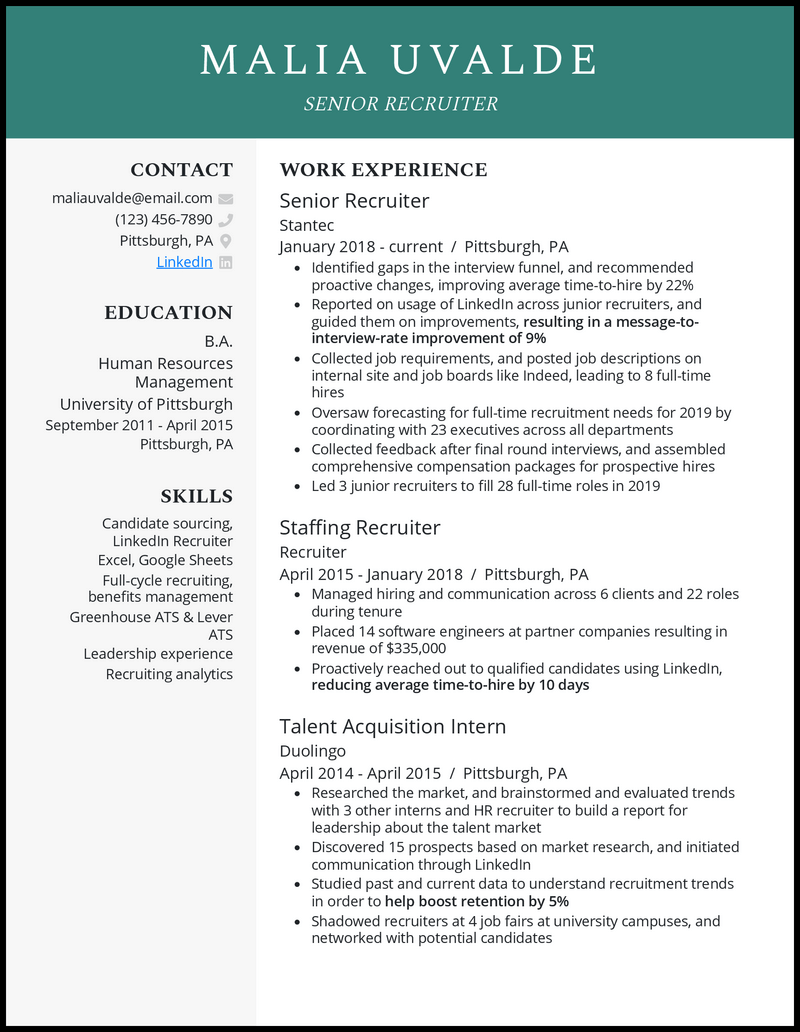You handle all the recruiter job role classics like organizing applications, reaching out to candidates, vetting applicants and conducting interviews, and recommending the best options to your hiring manager. You probably also leverage your seniority for the betterment of less experienced recruiters, leading hiring initiatives and providing guidance.
But that doesn’t mean you can’t have questions about your own resume. How do you distill your experience into a winning resume and complementary recruiter cover letter that demonstrate your stellar leadership and candidate assessment?
We’ve got this covered: Take a look at our three versatile senior recruiter resume templates, reliable tips, and AI cover letter generator. You’ll pick up speed before you know it!
Why this resume works
- You go through hundreds of resumes daily, so you know the drill. Now, if your senior recruiter resume doesn’t take the hiring manager’s breath away, your resume will end up in the trash pile. What’s the secret? Show them you know the ropes.
- Malia, for example, flaunts her wins as a senior recruiter at Stantec, letting the hiring manager know they can count on her to get the job done. And remember, you have to do it right to get the best results, i.e., quantify your outcomes and use active language for clarity.
Related resume examples
What Matters Most: Your Skills & Professional Experience

One of the more important things for you to consider while filling out the skills section in your resume is scope. At a senior level, you’ll want to demonstrate a broad range of abilities to show that you’ve learned as much as you can throughout your recruiting journey.
And now that you’ve learned those skills, you’re ready to share them with other recruiters! So, make sure they’re as exclusively relevant to your position as possible. Let your specializations shine.
Avoid the generic and hone your abilities to show depth and advanced knowledge of your field. Include soft skills like interviewing that play key parts in the recruitment process itself.
Here are some examples:
9 most popular senior recruiter skills
- LinkedIn Recruiter
- Google Sheets
- Team Leadership
- Greenhouse ATS
- Lever ATS
- Recruiting Analytics
- Full-cycle Recruiting
- Benefits Management
- Salesforce
Sample senior recruiter work exerience bullet points
As a senior recruiter, now’s the time to really show your prowess. As you surely know, other recruiters will want to see what you’ve used your budget management skills to achieve. They’ll want a few thoughtful and refined hints about how your experience will benefit their particular company, too!
Each experience section bullet point should bring fresh value to your resume and add to your story of skill-building, advancement, and collaboration. Strive to include an engaging variety of examples, from onboarding to recruiting team management.
And always back those examples up with data! You need to measure your impact and quantify your success: Why say, “I did something” when you can say, “Look how my efforts to boost company savings paid off”?
Consider these samples:
- Placed 14 software engineers at partner companies within two months, gaining $334,826 in revenue
- Studied past and current data to understand recruitment trends, adjusting hiring strategies and boosting retention by 6%
- Proactively reached out to qualified candidates using LinkedIn, reducing average time-to-hire by 11 days
- Collected feedback after final round interviews, applying results to optimize future hiring strategies for the recruitment team and increasing hiring efficiency by 16%
Top 5 Tips for Your Senior Recruiter Resume
- Don’t skimp on metrics
- You really do need them! Just look at those examples of retention and hiring efficiency increases and imagine how much flimsier they’d be without numbers. If you can, try to include more than one supporting metric per experience point—as long as it doesn’t get too wordy.
- Emphasize depth of knowledge
- You’ve been at this for a while now! That’s an excellent accomplishment, and you should make the most of it by showing the depth of knowledge you’ve gained regarding topics like benefits plans. If you’ve become an absolute pro at creating hiring strategies, show it!
- Focus on growth, too
- While you want to maintain a trend that shows your unique specialization or knack throughout your career, you should also show increasingly complex milestones that build up your leadership credibility. This will show that you’ve grown through the years and advanced your recruiting abilities.
- Use a mature, professional layout
- Make sure the layout you choose for your resume makes personal strengths like organization and experience advancement the primary focus. Avoid any loud colors or fonts and make sure everything is readable. Check carefully for typos.
- Showcase your versatility
- Versatility is key for anyone in a senior role! As a senior recruiter, you want to show that you’re ready for anything. If there was a sudden, high demand for employees and you rose to the occasion, say so. If you also created a whole new template for job ads, mention that, too.
How to Write a Senior Recruiter Resume

- List your recruiting experiences in reverse-chronological order
Once you’ve reached a senior position, you’ll have many years of experience creating interview funnels and optimizing job descriptions. Listing your most recent experiences first will help emphasize your most relevant skills and allow hiring managers to easily look back and see how you’ve grown in your career.
- Consider a summary of your recruiting experiences and skills
Resume summaries work well for senior recruiters with years of experience in the field. For instance, a few sentences about how you’ve managed the hiring process for over 200 job openings and used interview funnels to fill jobs 55% more efficiently during your 11-year career would make your abilities stand out.
- Use metrics to show what you’ve achieved
You understand how important metrics are in the hiring process to make effective decisions. Therefore, showcasing key numbers like application completion rates and position fill rates in your resume will help catch a hiring manager’s eye.
- Keep your senior recruiting resume on one page
With years of recruiting experience, you should focus on what’s most relevant to avoid overwhelming hiring managers with too much information. Limit your resume to one page and focus on key positional needs. For instance, if the job involves recruiting for remote positions, you may want to focus your skills on using online job boards and conducting interviews over Zoom.
Check back with the recruiter job description—it’s your friend! Look for any ATS buzzwords, company vision statements, or examples of writing tone that you can align yourself with through your stories of employee satisfaction and policy development. Reflect these in your resume.
If you have some outstanding experience examples that couldn’t quite make it onto your one-page resume, then you could always craft an impressive cover letter! Professional references that bolster your seniority and hiring efficiency never hurt, either.
Metrics that don’t really apply to your actual impact aren’t the best use of space. At a senior level, you probably have plenty of examples with data that applies directly to the impact you left upon the hiring strategy, so stick with those!




![3 Senior Recruiter Resume Examples [& Templates]](https://beamjobs.wpenginepowered.com/wp-content/uploads/2023/03/senior-recruiter-elegant-resume-example.png)



